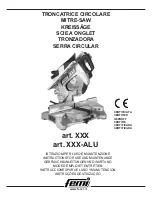
Page 12
Fig. 5
SWITCH
KEY
FEATURES
WARNING:
Although some of the illustrations in this manual are
shown with the blade guard removed for clarity, do not
operate the saw without the blade guard unless specifically
instructed to do so.
OPERATING COMPONENTS
The upper portion of the blade projects up through the table,
surrounded by an insert called the throat plate. To cut wood
at a bevel, the blade must be tilted, using the bevel handle,
scale, and bevel indicator found on the front of the cabinet.
Inside the cabinet, adjustable positive stops are provided for
0
°
and 45
°
.
Your saw includes a rip fence and miter gauge with undertable
storage for easy accessibility. The sliding table extension
can be moved to provide 27 inches of rip capacity. The rip
fence is used to position work that will be cut lengthwise. A
scale on the front rail shows the distance between the rip
fence and the blade.
The leg stand places the table saw at convenient working
level. Once folded, the leg stand wheels make moving and
storage easy.
The blade guard assembly includes a riving knife which is a
metal device directly behind and above the blade. It is used
to help keep the cut wood from binding together and causing
possible kickback. It is very important to use the riving knife
for all through-sawing operations. The anti-kickback pawls
(also a part of the blade guard assembly) are toothed plates
mounted on the riving knife. Their teeth point away from the
work in case the work should be pulled back, toward the
operator. Then the teeth dig into the wood to help prevent or
reduce the possibility of kickback.
POWER SWITCH
Your table saw is equipped with a power switch that has a
built-in locking feature. This feature is intended to prevent
unauthorized and possible hazardous use by children and
others.
TO TURN YOUR SAW ON:
1. With the switch key inserted into the switch, lift the switch
button to turn on ( ).
TO TURN YOUR SAW OFF:
1. Press the switch button down to turn off ( ).
TO LOCK YOUR SAW :
1. Press the switch button down.
2. Remove the switch key from the switch and store in a safe,
secure location.
WARNING:
Always remove the switch key when the tool is not in use
and keep it in a safe place. In the event of a power failure,
turn the switch off ( ) and remove the key. This action
will prevent the tool from accidentally starting when power
returns.
WARNING:
ALWAYS make sure your workpiece is not in contact with
the blade before operating the switch to start the tool.
Failure to heed this warning may cause the workpiece to
be kicked back toward the operator and result in serious
personal injury.
WARNING:
To reduce the risk of accidental starting,
ALWAYS make
sure the switch is in the off ( ) position before plugging
tool into the power source .
SWITCH IN LOCKED POSITION
SWITCH
BUTTON
IN OFF
POSITION
SWITCH
BUTTON
IN ON
POSITION
Summary of Contents for BTS20
Page 33: ...Page 33 NOTES NOTES ...













































